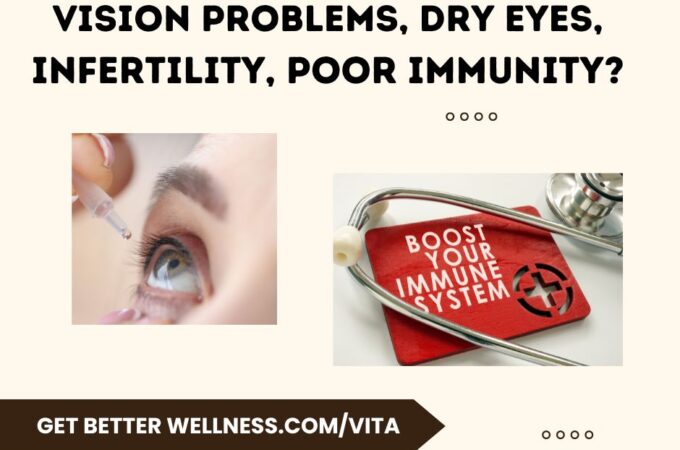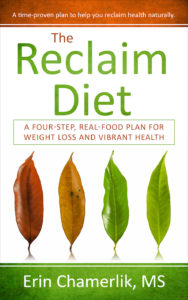
Vision Problems, Dry Eyes, Infertility, Poor Immunity? What about this Vitamin?
Symptoms of vitamin A deficiency (and why fruit and veggies don’t have vitamin A)
Your body needs vitamin A for physiological processes, normal immune and reproductive function, and eye health.
- Night blindness: having a hard time seeing or driving at night
- Dry eyes
- Frequent infections especially in the respiratory tract
- Increased susceptibility to vaginal yeast infections
- Poor wound healing
- Frequently tired or fatigued
- Sluggish thyroid or hypothyroidism
- Infertility or difficulty conceiving
- Dry, rough, bumpy skin; keratosis pilaris or chicken skin
- Eczema, psoriasis, acne
- Vision trouble or vision loss
- Iron deficiency anemia
- Stunted growth in children
- Autoimmune disease
Healthy Levels of Vitamin A is Not About Carrots
- The human body is not able to produce vitamin A, and therefore, it is necessary to obtain it from the diet.
- Did you know that eating a pile of carrots may do nothing to help your vision because fruits and vegetables DO NOT contain any true (active) vitamin A.
- The scientific term for vitamin A is retinol, because of its presence in the retina of the eye.
- Vitamin A is commonly mistaken with its precursor, beta-carotene (carotenoids). Vitamin A and beta-carotene are NOT the same thing but the FDA regulations allow food processors to label carotenes as vitamin A. No wonder we are confused!
True vitamin A is absolutely essential for several physiological functions: vision, reproduction, immunity, metabolic pathways and cellular communication.
Diabetes and Hypothyroidism
Foods high in vitamin A are especially important for diabetics and those suffering from thyroid conditions.
- The thyroid gland cannot function properly without vitamin A.
- Low vitamin A is an independent risk factor for diabetes.
- A diet rich in vitamin A will help protect the diabetic from the degenerative conditions associated with the disease, such as problems with the retina and with healing. [source][source]
How to increase your intake of true vitamin A (retinol)
- We need to get vitamin A in the form of retinol.
- The ONLY source of preformed vitamin A is in animal foods.
- Retinol is the form of vitamin A that is the active form that our bodies use.
- There is no vitamin A in any plant.
- Plants have carotenoids, like beta-carotene, which might be converted to vitamin A but in reality there is very little vitamin A being produced from carotenoids for several reasons.
Plant carotenoids need to be converted in the body to true vitamin A. Most people cannot make his conversion effectively—some can’t make this conversion at all due to:
- Genetics – Many people are poor at converting carotenoids to true vitamin A due to genetics alone.
- Gut health
- Gallbladder removed – If you have had your gallbladder removed, conversion will be difficult because adequate bile is needed to convert carotenes to vitamin A.
- Hypothyroidism or thyroid disorders
- Age – if you are very old or very young
- Zinc deficiency – zinc is needed to convert carotenoids to true vitamin A
Do you get yellow or orange looking skin when you eat a lot of carrots or juice carrots?
One of the symptoms that you can see in people who don’t make the conversion to vitamin A at all is yellowish or orangish skin, especially if they eat a lot of carrots or drink a lot of carrot juice or juice made from other foods high in carotene: sweet potato, bell pepper, spinach, carrots, cantaloupe, mango, apricots, broccoli, pumpkin, squash.
You cannot depend on getting your vitamin A from plant foods.
- The human body is not able to produce vitamin A. It is necessary to obtain it from the diet.
- You need to get vitamin A from animal foods and the best source is liver.
- Try to eat 3+ ounces of beef liver every week.
- If you can’t eat liver, then take high quality Cod Liver Oil, 2-3 tsp per day) provides 1700-2550 IU Vitamin A (510 – 765 RAE)*.
- We need 5,000 – 10,000 IU (1500-5000 RAE) of vitamin A per day, and we need more than that in times of stress. “Adequate vitamin A levels are needed to effectively produce serotonin, which can help manage stress.” [source]
- Average daily recommended amounts of preformed vitamin A are listed below in micrograms (mcg) of retinol activity equivalents (RAE).
Food Sources of vitamin A
- Cod liver oil
- Lamb, beef, calf liver
- Chicken liver
- Duck and goose liver
- Liverwurst sausage
- Egg yolks
- Butter
- Fish like herring, tuna and salmon
- Oysters and clams
Vitamin A Supplements
It is recommended to take 3,000 IU a day, or 10,000 IU twice a week. Avoid taking too much and make sure your Vitamin D levels are adequate.
I prefer 2-3 tsp of Cod Liver Oil daily, a food source that also has Vitamin D, EPA, DHA.
Another option is Vitamin A 3,000mcg (10,000IU) – Twice a week.
The Standard American Diet Leads to Low Vitamin A
Do you consume a high amount of processed foods and polyunsaturated vegetable oils? Do you eat lots of high-fiber foods or take fiber supplements? These will bind vitamin A and take it out of your body.
———-
Additional Resources
https://www.westonaprice.org/health-topics/vitamin-a-mazing/#gsc.tab=0
https://my.kresserinstitute.com/wp-content/uploads/2020/10/OE-Supplementation-Vitamin-A.pdf
Macular Degeneration – Preventable & Treatable
Dr. Knobbe Presents, ‘Macular Degeneration – Preventable & Treatable – With an Ancestral Diet?’ at Weston A. Price Foundation’s Annual Conference – Wise Traditions – 2017
Get Better Wellness is reader supported. This post may contain affiliate links, which means that I may receive a small commission when you buy from links on this site. This is at no cost to you.
Recommended
-
Dandelion for Liver Support and Health BenefitsJuly 20th, 2024
-
Modified Citrus PectinJuly 11th, 2024
-
Bentonite Clay Mask for Face and ArmpitsJuly 8th, 2024
-
Two Supplements for Erectile DysfunctionJune 30th, 2024








